Do betta fish sleep? That’s what many betta owners ask when they first bring their new fishy friend home.
We can tell you that, yes, betta fish do sleep, and they also nap for short periods of time throughout the day.
So, how long do betta fish sleep? Where do betta fish like to sleep? And how much sleep do betta fish need to stay healthy?
Read this guide to learn everything you need to know about your betta buddy’s sleeping habits.
Do Betta Fish Need Sleep?
Yes, like all fish species, your betta sleeps!
Fish don’t sleep in the same way that you do. After all, most fish are prey animals, so they must keep some level of awareness to avoid being snatched by a predator while they’re resting. Your betta does that by slowing down his metabolism and becoming less active while remaining alert to threats.
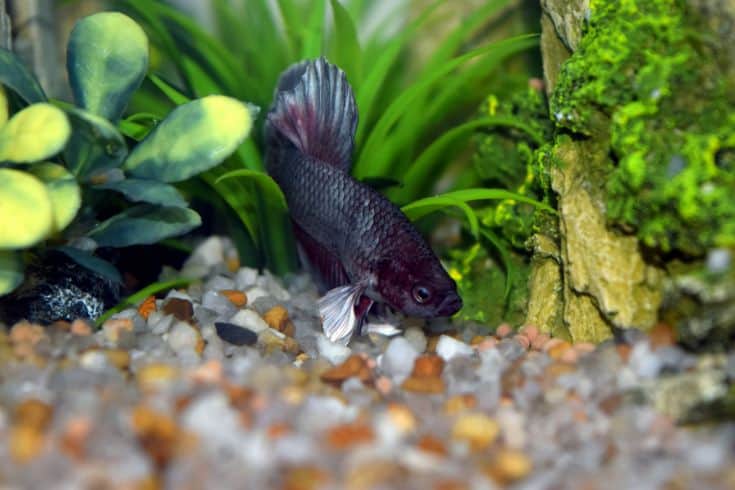
So, instead of being unconscious, your fish enters a period of “suspended animation” when he can recharge his batteries in the same way as you do.
How Long Do Betta Fish Sleep?
Betta fish mostly sleep at night when the tank lights go out.
It’s tricky to know exactly how much sleep your betta has, though, since you’ll be asleep at night yourself!
However, taking into account the daytime naps your fish enjoys and his regular nighttime sleep, we estimate that your betta buddy spends around 12 hours asleep.
How Much Sleep Do Betta Fish Need?
Since betta fish don’t have eyelids, they need to have a rest from your aquarium lighting at night to ensure they get the sleep they need to stay healthy.
It’s a betta’s natural instinct to feed and become active when the sun rises. Conversely, the fish know that it’s time to sleep when the sun sets at night. You must replicate that in the home aquarium by ensuring your tank lights are only on for between eight and ten hours during the day and are switched off at night.
Where Do Betta Fish Like To Sleep?
Bettas can sleep pretty much wherever they feel like taking a nap.
The Substrate
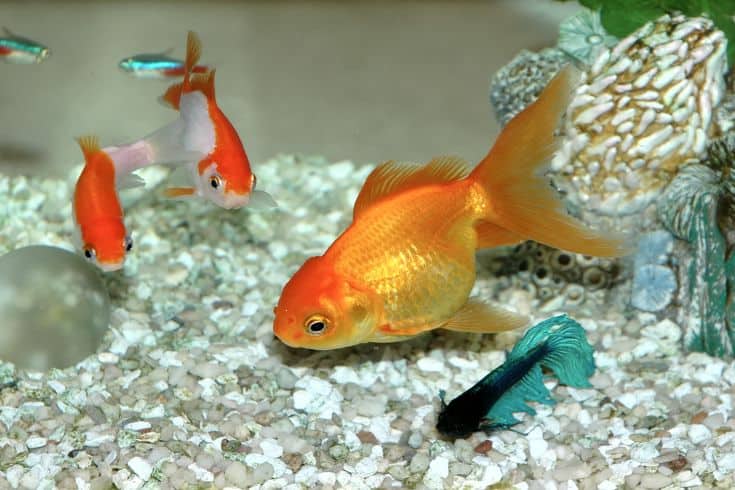
Betta fish are surface feeders, and they need to make regular visits to the water’s surface to breathe atmospheric air through their labyrinth organ.
So, you might think there’s something wrong with your betta if you see him lying on the bottom of the tank. Don’t panic! It’s quite normal for bettas to nap on a comfortable spot on the substrate, especially if you use soft sand or fine gravel.
That said, if your betta spends too much time lying on the bottom, there could be a problem.
Too Much Flow
Wild bettas inhabit water bodies where the flow is low, such as water ditches, rice paddies, puddles, and marshes. If your filter puts out too much current, your betta might struggle to swim, especially if he has long, luxuriant finnage. In that case, you might find that your pet sinks to the tank bottom to escape the flow.
Hot Spots
Bettas don’t enjoy fluctuations in water temperature, so if your tank is close to a radiator, in direct sunlight, or near a drafty window, your fish might simply be relocating to a more comfortable spot.
To prevent temperature variations in the tank, put the heater close to the filter outflow to ensure that warm water is circulated right around the aquarium.

In addition, use a high-quality digital aquarium thermometer placed at the opposite end of the tank from the heater unit. That shows you if the temperature is equal throughout the tank.
A Betta Hammock
Bettas love to relax on a comfortable surface close to the water’s surface.
You can buy betta hammocks from good pet stores and online, and your betta will definitely appreciate one. These betta accessories are made from soft, fish-safe plastic in the shape of a large leaf and are fixed to the aquarium glass by means of a suction cup.
You can move the hammock around the tank to ring the changes and keep life interesting for your betta fish. In addition, betta hammocks are easy to clean.
Flat Leaves
If you don’t want to have a plastic hammock in your betta’s tank, natural, broad-leaved aquarium plants can provide the same comfy resting spot for your pet.
The best plants to choose for a betta tank are those with broad, flat leaves, such as Anubias. The plant’s leaves provide a supportive, cup-like bed where your pampered pet can snooze the day away.
If you don’t want the hassle of looking after live plants, you can use artificial aquarium plants as tank ornaments instead. However, always choose silk plants, as plastic plants can sometimes be sharp and present a hazard to your pet’s delicate finnage.
When Do Betta Fish Sleep?
Although they are not nocturnal, bettas tend to take lots of naps throughout the day. In their natural habitat, betta fish are diurnal, meaning that they are most active during the daytime, doing most of their sleeping at night when the tank light goes out.
So, if your betta is very lethargic during the daytime, he might have a health problem that you’ll need to investigate.
Factors That Impact Betta Sleep Patterns
Several factors can impact your betta’s sleep patterns.
Water Quality
Bettas are quite sensitive to poor water quality, so if the conditions in your tank are poor, your betta could struggle to establish a regular, healthy sleeping pattern.
Tank Size
If you keep your betta in a tank that’s too small, that can lead to overcrowding. In a busy tank with lots of active tank mates, sleeping and even napping can be difficult, leading to disrupted sleeping patterns for your betta fish.
Water Temperature
Your betta is a tropical fish that needs warm water temperatures that are equal to the ambient temperature outside the tank. If there’s too much difference between those temperatures, your betta’s labyrinth organ could be damaged.
In addition, if the temperature is too hot or too cold, your betta will become stressed and won’t be able to nap and sleep when he needs to.
Lighting Levels

Bettas need a regular day/night cycle to remain healthy. So, if your aquarium lights are on for too long and your betta is exposed to bright, constant light, he will be unable to sleep.
Noise
Bettas can be sensitive to noise and vibrations from outside the tank, which can startle the fish, leading to stress and making it difficult for your pet to relax and snooze.
Diet
Digestive issues, such as bloating or swim bladder disease, can prevent your betta from getting the rest he needs.
So, you must ensure your pet gets the correct combination of foods in the right quantities and you don’t overfeed him.
Common Positions While Sleeping
Like people and other pets, betta fish have their own preferred sleeping positions, and that varies between fish.
- Some bettas enjoy sleeping on their side.
- Some betta fish prefer to sleep vertically with their heads uppermost or even upside down!
- Many betta fish wedge themselves between an aquarium filter box and the tank glass.
- Some bettas curl up and sleep in that position.
Bettas are light sleepers, so if you go over to the tank so that your betta can see you, he’ll often swim away or come over to investigate and see if you’re bringing food or a treat for him.
However, if your pet spends a lot of time on his side, upside down, or in the same place and position, that could indicate he’s sick.
Reasons Why Your Betta Is Sleeping A Lot
Bettas are generally quite active fish that spend lots of time patrolling their territory or interacting with tank mates.
If your betta fish is sleeping much more than normal during the day, you need to check to make sure there are no issues with water quality and temperature. You must also check that your betta fish isn’t suffering from some health problem that’s disrupting his sleep patterns.
Common reasons for betta fish to sleep more than they should include:
Too Cold
As mentioned above, if your betta’s tank is too hot or too cold, he could go into temperature shock.
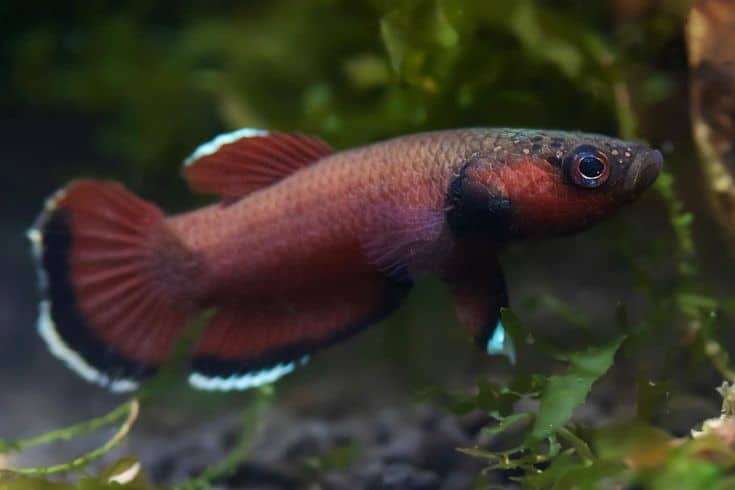
Bettas need warm water to remain active. In cold temperatures below 72oF, the betta’s metabolism could slow down, and he will become very lethargic, losing all interest in food, his tank mates, and even his beloved owner!
Warm the tank water gradually over an hour or so, as heating things up too quickly could make the problem worse. Once your betta warms up, he should become active again.
Needless to say, betta tanks need a heater so that you can ensure the water stays at a temperature sweet spot of 78oF.
Not Enough Light
The amount of sleep your fish has is determined to some extent by how much light is in his fish tank. Although you don’t want your aquarium fish to be exposed to constant bright lighting, you don’t want him living in the dark, either.
Ideally, your betta should receive between eight and ten hours of light daily. That’s especially important if you have living plants in your betta tank, as the plants need light for photosynthesis.
Bored Betta?
Bettas are intelligent fish that can learn simple tricks, such as jumping through a hoop to get a reward. In nature, bettas spend most of their day patrolling their adopted territory, defending their patch from intruders, and hunting for food.
So, your betta buddy needs plenty of physical and mental inspiration to keep boredom away. A few peaceful tank mates, such as Corydoras catfish, shrimp, and snails, can be all your betta needs to keep him happy and busy.
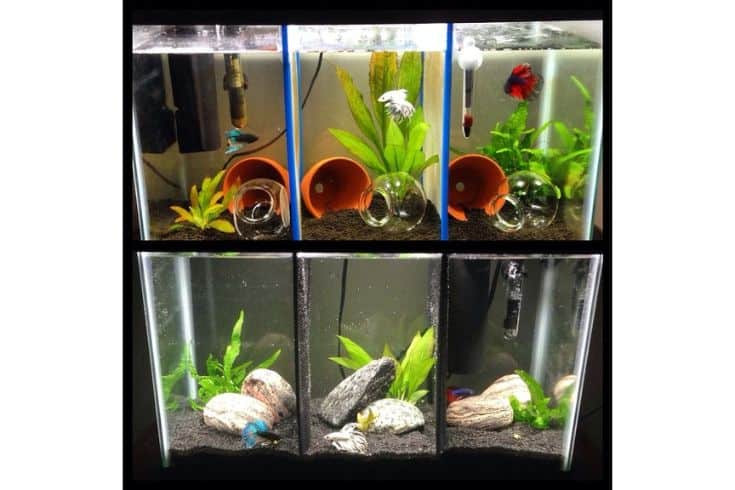
If your betta is bored, he could become depressed and resort to sleeping to pass the time.
Sick Betta
Every betta has his own personality, and you’ll quickly get to know your pet’s quirks, likes, and dislikes.
If your pet’s behavior suddenly changes so that he’s sleeping more than usual, you know that there’s a potential health problem brewing. First, check that the conditions in your tank are okay, then look for signs of illness in your betta fish.
Signs of sickness can include the following:
- Swellings on the fish’s body
- White spots on the skin, fins, and gills
- Cottony growths around the fish’s mouth and head
- Ulcers, red patches, or sores on the fish’s body
All those signs could indicate that your betta is suffering from a bacterial infection.
A sick betta will sleep more than a healthy betta fish, and his color vibrancy will fade so that those gorgeous bright colors you love will gradually disappear.
Constipation
Siamese Fighting fish can be greedy creatures that easily become constipated if they are overfed or given an incorrect diet. That can cause swim bladder problems, preventing the betta from swimming properly and even causing him to sink to the bottom of the tank.
If you see your beautiful fish lying on the substrate, seemingly unable to swim, he could be suffering from constipation. To treat the problem, fast your fish for 24 hours, and then offer him a small portion of thawed, frozen bloodworms. In my experience, that treatment is usually an effective cure.
Senior Betta
Most bettas live for around four years or sometimes less. Betta fish owners with senior pets should expect their fish to nap and sleep more than younger fish.
That’s fine; just let the old guy take naps and sleep when he needs to.
Lazy Betta!
Although the average betta fish is pretty active, some bettas are just bone idle and can’t be bothered with life, preferring to spend all day resting up on a comfortable leaf or sleeping in a cave.
If you have a lazy betta, you should encourage your fish to move more so that he doesn’t get fat. Try providing your pet with a few toys or tank mates to keep him busy.
Obesity is extremely dangerous to human health, and the same applies to your betta fish. If your betta buddy gets fat and takes no exercise, he will probably have a shorter lifespan than usual.
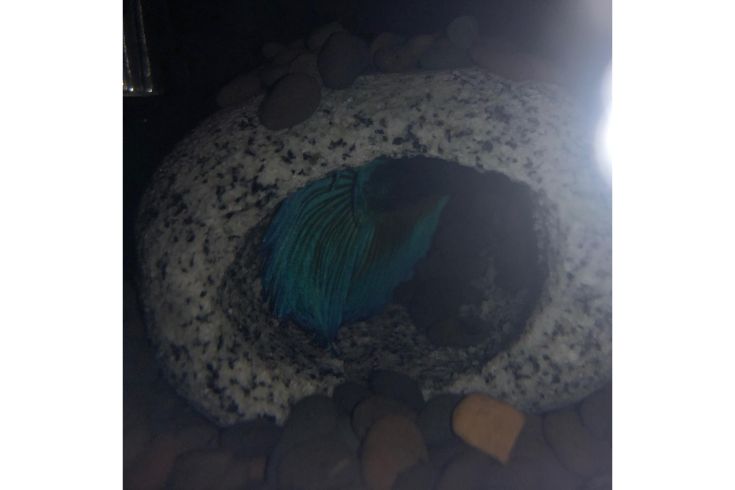
Final Thoughts
Did you enjoy learning about your betta buddy’s sleeping habits? If you did, please take a moment to share the article.
Betta fish need their beauty sleep! Not only do the fish sleep at night, but they enjoy taking frequent naps throughout the day, too. How many hours healthy bettas sleep and how often depends on the individual, but they are all pretty lazy fish. If provided with plenty of resting places and a comfortable environment, your pet can spend much of his day just dozing.
Does your betta like to snooze away the day, or does he break the mold and stay active most of the time? Tell us about your pet in the comments box below.
